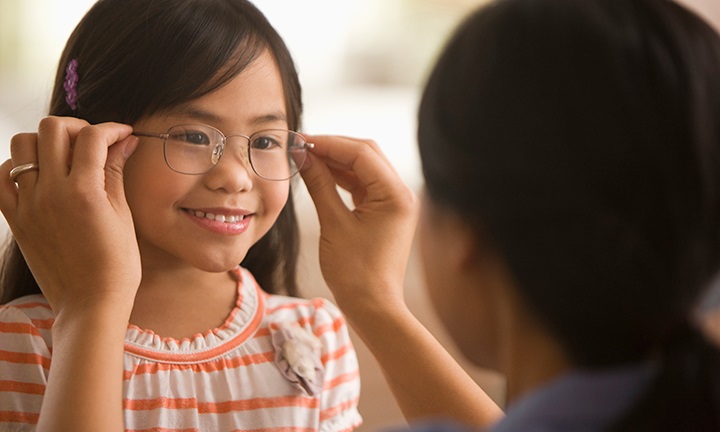Everyone’s eyesight is bound to decline a little bit as they age. Still, there’s so much good you can do for your eyes to reduce or prevent vision problems. When it comes to seeing your grandchildren’s faces clearly, rereading your favorite book, or driving yourself down memory lane (maybe literally), you don’t want to leave your vision to luck alone.
What Are The Most Common Age Related Vision and Eye Problems?
As you get older you may notice changes to your eyes and vision, here are the six common age-related vision and eye problems:
1) Presbyopia or age-related farsightedness
Starting in your 40’s, the lenses in your eyes may begin to become less flexible and lose their ability to change shape and focus light precisely. As a result, it becomes increasingly difficult for your eyes to focus on close-up objects, like small print in books and on medicine bottles. Even if you do experience presbyopia at some point in your life, the good news is, it is easily corrected with reading glasses or minor surgery.
2) Age-related macular degeneration
AMD, as it’s known by its acronym, is one of the most common causes of vision loss in individuals above the age of 50 (although most cases occur after 60). AMD results from gradual damage to the macula, the central region of the retina responsible for maintaining the center of your field of vision. Eventually, this leads to a dimming of your central vision or even causes blind spots, making some of the most common daily activities, like driving, reading, and cooking a challenge.
3) Cataracts
Your eyes contain lenses that focus light onto the retinas at the back of the eyes and, as many people get older these eye lenses tend to become cloudy, decreasing your ability to see clearly. Although chances of developing cataracts increases after the age of 60, many people don’t encounter any severe vision loss until well into their 70s or even 80’s.
4) Glaucoma
Oftentimes known as the “silent thief of sight,” glaucoma is a little more difficult to detect because there are no symptoms in its early stages. Glaucoma can be caused by increased pressure within the eye but can also occur in people with normal levels of eye pressure. If left untreated, glaucoma can lead to nerve damage, peripheral vision loss, and even blindness.
5) Diabetic retinopathy
When you have diabetes, inflammation and poor blood flow resulting from the disease can cause some of the blood vessels in the back of your eyes to swell and leak fluid. Sometimes, new blood vessels are formed to compensate for the damaged vessels. This network of damaged and extra blood vessels begins to affect vision over time, eventually leading to blindness if left untreated.
Although diabetic retinopathy is not 100% preventable for those living with diabetes, it’s possible to slow down its progression by healthy management of your diabetes, combined with treatment from an optometrist.
6) Dry eye
Your eyes are constantly producing tears to lubricate and protect themselves from debris and the elements. Tear production might decrease for a number of different factors regardless of your age, but it becomes even more common as we get older. As a result, your eyes might begin to burn or become more frequently irritated. Not to worry though, there are endless over-the-counter eye drops available and new technology to help manage and treat dry eye. If dry eye remains a problem, talk to your eye doctor about more permanent solutions.
See Your Eye Doctor Regularly!
A good eye care routine includes an annual eye exam to help improve the chances of early detection and proper treatment for some of these eye problems. Starting at the age of 60 (40 if you’re African American), regular eye care becomes even more important, because you’re more likely to start experiencing vision problems.
After your first eye exam, your eye doctor has a baseline, making it much easier for them to track the changes in your eyes and provide the right eye care, especially if you are predisposed to any particular eye or vision conditions. During the first appointment, it is very important to discuss your family history with your eye doctor and report any symptoms you’ve been having or changes in your vision.
Ultimately, to prevent and help minimize any of the vision problems mentioned above, these symptoms need to be detected and treated early. Having an eye doctor examine your eyes regularly is the best way to guarantee that they stay as healthy as possible. If for some reason there are issues, then your eye doctor will advise you accordingly about which lifestyle changes you should make and which treatment options you might have to prevent further damage to your eyes.
Vision insurance can help keep the costs of these annual eye exams low. Luckily, finding the right eye doctor is easy with VSP®, which has the nation’s largest network of eye doctors, so you’re bound to find an eye doctor that is near your home or work.
Tips for Eye Health and Maintaining Good Eyesight
It may sound simple, but maintaining the health of your eyes is very similar to maintaining the health of your body. All the systems in our bodies are connected, so it makes sense, right? These four eye health tips will help you keep your eyes healthy and maintain good eyesight as you age:
1) Maintain a balanced diet
Eat foods rich in antioxidants and vitamins A, C, and E, like fresh fruits and dark, leafy greens. All of these vitamins and nutrients directly support the health of your eyes. Additionally, consuming smaller portions, choosing lean proteins (e.g., chickpeas and other legumes), and consuming foods rich in fiber and complex carbohydrates will help you not only maintain a healthy weight, but also better manage your blood pressure, blood sugar, and stress levels; all of which are risk factors for health and eye problems alike.
2) Exercise regularly
Exercise has been shown to not only improve your overall health as you age, but also your eye health. One study from the British Journal of Ophthalmology found that exercising more than three times per week reduced the chances of developing macular degeneration by 70%. So, no matter what your reason, getting active helps your eye health.
3) Limit alcohol and tobacco consumption
Both smoking and drinking are bad for your vision and act as stressors on your body that raise your blood pressure, increase oxidative stress, and decrease blood circulation. By cutting back on drinking and giving up smoking entirely, you can maintain healthy eyes in the later stages in your life.
4) Protect your eyes from the sun
Block out the sun’s harmful ultraviolet rays by wearing sunglasses that wrap around your face completely and have lenses that filter out the entire UV spectrum. Find sunglasses that block 100% of UVA and UVB rays to help protect your eyes from damaging UV exposure.
By following these eye care tips and seeing your eye doctor regularly, you’ll be stacking the odds in your favor for healthy eyes as you get older.
To help make your vision care more affordable, consider enrolling in a vision insurance plan. If you don’t have vision insurance, find out how VSP Individual Vision Plans can help you save on your next eye exam or pair of glasses.
This blog was reviewed by VSP Network Doctor Gabriela Olivares, O.D. Dr. Olivares earned her degree in Optometry at Nova Southeastern University in 2014. Her undergraduate schooling was completed at the University of Central Florida, where she received a bachelor’s degree in Molecular Biology and Microbiology. She currently works at a private practice with five other optometrists in Pembroke Pines, Florida.
Information received through VSP Individual Vision Plans’ social media channels is for informational purposes only and does not constitute medical advice, medical recommendations, diagnosis or treatment. Always seek the advice of your physician or other qualified health provider with any questions you may have regarding a medical condition.
Your vision. Your way.
Not covered for vision? Get an individual plan, customized for you – including where you want to use it: at the doctor, in a retail location, or even online.

Choosing the Right Vision and Dental Insurance
Taking care of vision and dental health promotes optimal whole-body wellness. From enjoying the immediate benefits of clean teeth and clearer vision...

Do Kids Need Vision Insurance?
Any parent can tell you that kids grow up quickly, which is why it’s important to monitor all aspects of their health regularly. One way to ke...

What to Expect at a Child’s First Dental & Eye Exam
As children grow from babies to toddlers, there are many growth milestones that are celebrated; first steps, first words, and first vacations or out...

